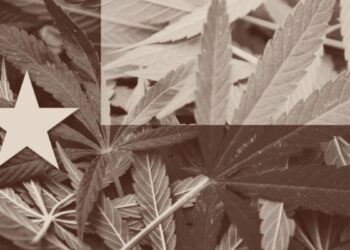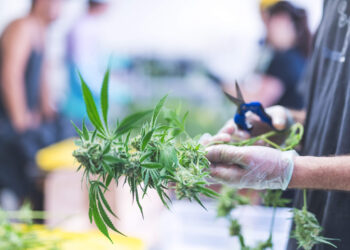
In a recent study published in the International Journal of Mental Health and Addiction, researchers from Rutgers and Columbia universities, along with the University of Arizona, revealed intriguing insights into the impact of medical cannabis legalization (MCL) on nonprescribed opioid use.
The study, which analyzed national survey data spanning from 2004 to 2014, discovered a modest reduction in the regular and frequent use of nonmedical prescription opioids (NMPO) following MCL. However, it also observed a slight increase in occasional NMPO use, suggesting a nuanced relationship between medical cannabis and opioid consumption.
A striking interpretive image accompanying the study symbolically captures the societal impact of MCL on opioid usage. The image portrays a diverse community engaged in positive interactions, with a vibrant cannabis plant at the center representing hope and healing. Faded images of opioid pills in the background convey their diminishing presence, emphasizing a collective journey towards overcoming opioid dependence.
Notably, the study identified individuals diagnosed with cannabis use disorder (CUD) as the primary drivers of these trends. Among this group, frequent opioid use decreased by 4.9% post MCL, while occasional use increased by 5.6%. Lead author Hillary Samples, a professor at the Rutgers School of Public Health, emphasized the need for a broader harm-reduction framework and more effective interventions to address the opioid crisis.
Accompanying the findings is an illustration depicting a peaceful community park embracing medical cannabis as a means to reduce opioid dependency. The scene conveys a shift towards wellness and natural remedies, symbolizing the societal benefits of MCL.
Despite the potential benefits highlighted in the study, the authors caution against overlooking the tradeoffs, including increased cannabis use and disorder. They suggest future research should explore the motivations behind cannabis use to better understand MCL’s impact on opioid consumption.
The article also references additional research supporting the idea of cannabis as an alternative to opioids, including a federally funded study linking marijuana use to reduced opioid cravings and the American Medical Association reporting reduced opioid use among chronic pain patients using medical marijuana.
In conclusion, while the study’s findings contribute to growing research on the complex relationship between medical cannabis legalization and opioid use, it underscores the need for comprehensive strategies and continued scientific inquiry into alternative solutions for opioid dependence.
Read the whole article here.











